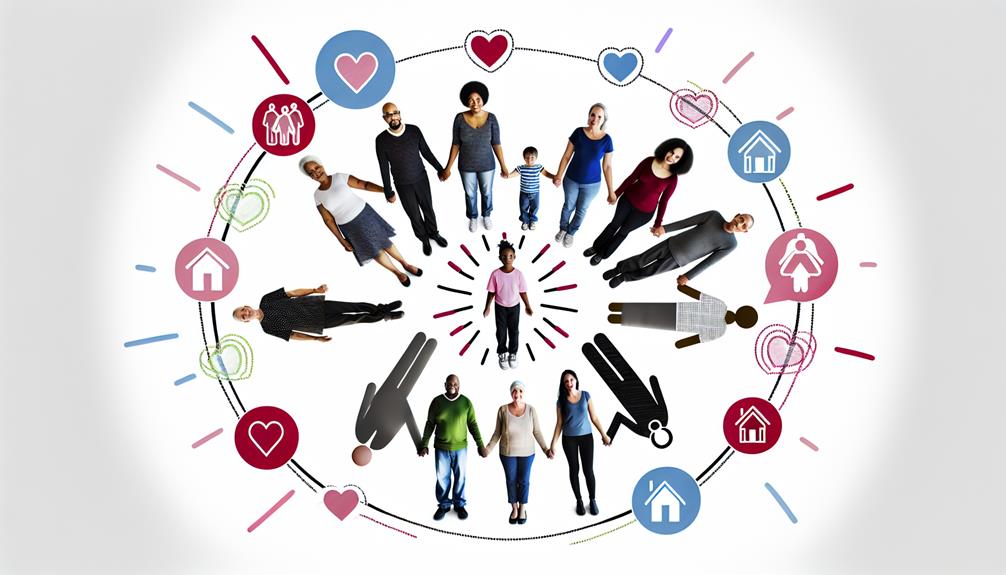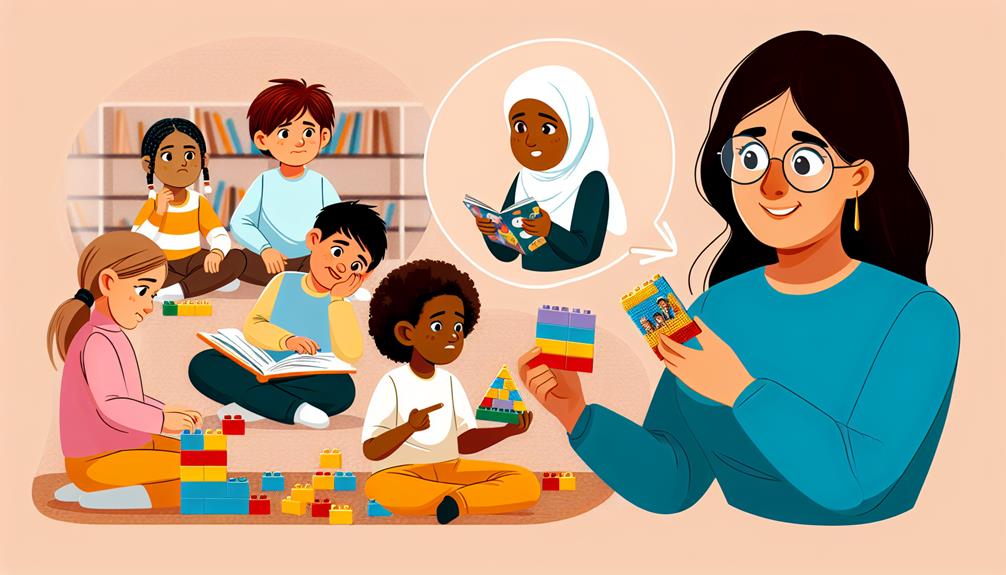Addressing foster care challenges requires in-depth understanding and thoughtful reform. You're looking at improving screening processes for suitable foster parents, boosting community involvement, and addressing existing process shortcomings. Enhancing and evaluating training programs will empower child welfare workers and foster parents. Mental health services, tailored resources, and advocating for stronger legal rights are also essential components of effective reforms. Remember, every step you take to foster change impacts the lives of countless children. Stay with us, there's much more to uncover for affecting much-needed transformation in the foster care system.
Key Takeaways
- Implementing enhanced training programs to equip foster parents and child welfare workers with the necessary skills and understanding.
- Strengthening foster family support through adequate resource allocation and emotional well-being advocacy.
- Enhancing training programs through collaborative curriculum development, continuous assessment, and foster parent feedback.
- Promoting mental health services for foster children, including access to therapeutic interventions and stigma reduction efforts.
- Advocating for improved legal rights for foster children, reshaping the foster care system through legal advocacy.
Identifying Key Foster Care Challenges
In the face of the complex web of issues surrounding foster care, it's important for you to understand the key challenges that children, foster parents, and the system itself often grapple with. One such challenge is the need for improving the screening process. You see, not everyone is cut out to be a foster parent. It takes a special kind of compassion, patience, and resilience to navigate the system and provide a nurturing environment for children in need.
A rigorous, thorough screening process is vital not just for the well-being of the child being placed, but also for the prospective foster parents. It's about ensuring that the match is beneficial for both parties involved. However, the current process often falls short, leaving children in homes that may not be the best fit for them, and foster parents feeling overwhelmed and unsupported.
Encouraging community involvement is another key factor. It's not enough to simply place a child in a home and assume everything will work out. The entire community needs to rally around these families, providing support and resources. By working together, we can begin to address these challenges and create a better system for everyone involved.
Need for Enhanced Training Programs
Beyond the screening process, there's a pressing need for enhanced training programs to better equip both foster parents and the child welfare workforce. It's not just about filling a home with a child; it's about ensuring that you, as a foster parent, can provide an environment where the child feels safe, loved, and understood. The same applies to the child welfare workforce; they need to be empowered with the right skills and knowledge to make informed decisions that impact the lives of these children.
Program evaluation plays a pivotal role here. By evaluating the effectiveness of training programs, we can determine what's working and what needs improvement. These insights are crucial for the design and delivery of more robust, targeted training initiatives.
Training effectiveness isn't just about the quantity of knowledge imparted, but the quality. It's about instilling a sense of empathy, understanding, and advocacy. It's about teaching you to navigate through the complex dynamics and challenges unique to foster care. Because at the end of the day, every child deserves a chance at a better life, and you have the power to make that difference. So, let's work together to enhance these training programs, because we owe it to these children, and to ourselves.
Strengthening Foster Family Support

You're not alone in the desire to strengthen foster family support. It's a need that's recognized by everyone involved, and it's vital to enhance training programs, provide sufficient resources, and promote emotional well-being for our foster families.
Let's explore these points together, advocating for the reforms that can make a significant difference in the lives of our foster children and their families.
Enhancing Training Programs
Let's shift our focus toward enhancing training programs, an essential step in strengthening the support systems for our foster families. You can't underestimate the power of an effective, all-encompassing curriculum that equips foster parents with the right skills. It's through partnership collaborations and curriculum development that we can make this happen.
| Key Area | Strategy | Outcome |
|---|---|---|
| Curriculum Development | Collaborative design of training materials | Enhanced understanding and skills |
| Partnership Collaborations | Work with child welfare agencies, experts, and experienced foster parents | Improved training content |
| Support System | Regular follow-ups and additional training | Reinforced learning and continual support |
| Feedback Mechanism | Foster parent feedback implementation | Improved curriculum relevance |
| Evaluation | Regular assessment of training effectiveness | Continuous improvement of the program |
Together, let's push for training programs that truly put the needs of foster families first.
Providing Adequate Resources
After strengthening our training programs, it's equally vital to guarantee we're providing ample resources to strengthen our support for foster families. In the domain of resource allocation, it's about more than just budget planning. It's understanding that each family's needs are unique and require tailored support. You see, it's not just about money, it's about delivering resources that truly make a difference.
Consider things like educational materials, access to community services, and even respite care. Investing in these areas can bring about real, meaningful change. Your advocacy is instrumental in this. You can help push for reform that ensures foster families receive the resources they need. It's time we put our resources where they're most needed, don't you agree?
Ensuring Emotional Well-being
Exploring the emotional terrain of foster care is as vital as providing resources, because ensuring the emotional well-being of foster families is pivotal in shaping a nurturing environment for the children. It's here that Trauma Informed Care comes into play – a structured approach addressing the impact of trauma on children's lives. You must understand that trauma can alter a child's perception, leading to behavioral issues. Your role is to help them navigate these struggles with empathy and patience.
Moreover, resilience building is essential. Encourage foster children to face adversities courageously, fostering a sense of self-worth and competence. This not only aids their emotional well-being, but also equips them with skills for life. Remember, your support can make a monumental difference in their healing and growth.
Reforming Placement Procedures

In addressing the pressing requirement for foster care reform, it's essential to contemplate the placement procedures, which frequently pose a variety of challenges for both the children and the caring families. Enhancing placement transparency is one of the key steps to reforming these procedures. You, as a stakeholder in the process, must be aware of every step taken, every decision made, and the justification behind them. This transparency won't only provide you with peace of mind but also guarantee the child's best interests are being considered.
Cultural sensitivity, too, plays an integral role in reforming placement procedures. Understanding the child's cultural background can help place them in a fostering environment where they can connect with their roots while also adapting to a new family. This sensitivity, combined with transparency, creates a more inclusive and efficient placement process.
Advancing Legal Rights of Foster Children
Championing for the legal rights of foster children is another crucial aspect that needs your attention. Children's Advocacy isn't just a concept; it's a commitment to guaranteeing their legal protection. It's about standing up in courtrooms and policy debates, raising your voice for those who can't do so for themselves.
No child should navigate the complex legal system alone. As such, you must advocate for legislation that guarantees legal representation for all foster children. This would make certain that someone is always there to champion their rights, to demand their fair treatment, and to hold those accountable who fail them.
Moreover, you should advocate for laws that prioritize the child's best interests. Too often, these children's needs are bypassed in favor of bureaucratic convenience. That's not right. They deserve to have their voices heard and their interests respected, whether it's during custody battles or decisions regarding their care.
Enhancing foster children's legal rights isn't just about giving them a seat at the table; it's about turning that table towards justice. You can help shift that balance. You can be the advocate they need. Remember, your efforts in this arena have the potential to redefine their future, and in doing so, reshape the foster care system itself.
Promoting Mental Health Services

Fostering a strong mental health support system is essential for the well-being of children in foster care, as they often grapple with emotional and psychological traumas that require professional intervention. It's not just about providing a safe home, it's about ensuring they have access to therapeutic interventions that can help them heal and grow.
Moreover, it's important to work on stigma reduction. You can play a role in changing the narrative, educating others, and promoting understanding about mental health in the foster system.
To give you a closer look, here's a table showing some key aspects of this topic:
| Aspect | Importance | Action |
|---|---|---|
| Therapeutic Interventions | Helps children process trauma | Provide access to quality therapy |
| Stigma Reduction | Encourages open conversation | Educate others, advocate for understanding |
| Support System | Provides stability and consistency | Be available and consistent |
Frequently Asked Questions
What Are the Financial Implications of Becoming a Foster Parent?
As a foster parent, you'll face financial responsibilities. However, you'll receive parenting support, foster care stipends and potentially tax deductions. It's challenging, but don't forget the priceless impact you're making on a child's life.
How Can the Community at Large Contribute to Improving the Foster Care System?
You can be a beacon of change. Volunteer opportunities abound in foster care. Join mentorship programs, be a consistent presence, and advocate for reforms. Every act, big or small, can improve a child's life journey.
Are There Any Specific Measures in Place to Ensure the Education of Foster Children?
Yes, there are specific measures like Education Advocacy and Tutoring Programs to guarantee foster children's education. They're designed to meet their unique learning needs and provide academic support in a nurturing environment.
How Does the Foster Care System Handle Cases of Children With Special Needs?
The foster care system equips caregivers with special needs training, ensuring they can meet unique challenges. They're provided therapeutic resources to aid these children, advocating for their rights and prioritizing their holistic development.
What Are the Long-Term Effects on Children Who Grow up in Foster Care?
Growing up in foster care, you may grapple with grave attachment issues and endure emotional trauma. These struggles can profoundly impact your adult life, affecting relationships, mental health, and your ability to trust others.
Conclusion
So, you've tackled the beast of foster care reform with gusto! With your trusty steed of enhanced training and a shield of robust family support, you're transforming the landscape.
Brave knights of legal rights and mental health services, you're setting a new standard! Remember, it's not just about 'placing' kids, but giving them a home.
Onward, reformers! The children are counting on us, and we won't let them down. Let's change the world, one foster kid at a time.




